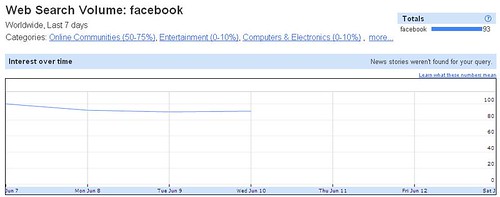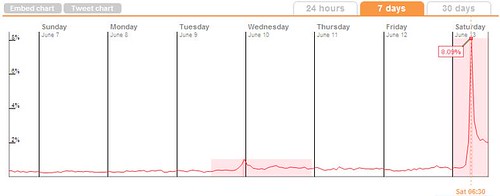I’m not a search expert, but working in communications requires at least basic knowledge about online search. Search is such a vital part of the way we find information about brands these days. A recent Swedish study (pdf) showed that among those who used the internet to search for information about products and services, 91 percent used a search engine.
We can also use data from search ingines to track the latest buzz online. A good tool to see trends in search behaviour is to use Google Insight For Search which shows how often different search terms have been used over time. It also tells you what terms have increased the most during the last few days.
If we use Google Insight For Search to see how often people search for the term Facebook, we can’t find anything unusual related to Facebook that happens right now.
But as most of you know, Facebook launched vanity URLs today on a first-come, first-served basis. So members who wanted to grab a specific name had to be alert this morning to secure the desired URL. Obviously the has been a lot of buzz about this on Twitter this morning, so a quick search for “Facebook” on Twist, a tool for trend search on Twitter, we discover that there was a big peak in mentions of Facebook on Twitter this morning.
It might not be the perfect tool, but I think the difference illustrates how Twitter and Twitter-related applications are becoming very useful in finding out what happens in close to real-time on the web. Other tools that analyze Twitter to bring you the latest buzz are MicroBlogBuzz (no 1 topic: Facebook Username) and Retweetradar (Facebook is one of the most retweeted phrases right now).
Google knows this, of course. This article states that Google is working on solutions for real-time search but I haven’t managed to find out how that works.
Tags: twitter, facebook, sociala medier, google, facebook, twitter. Ping.

